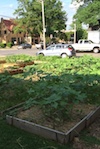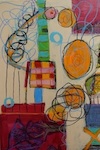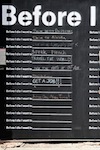 When I wash the dishes or grade the multiple choice quizzes, then, I try to cultivate my understanding of how those tasks fit into(yes!) the redemptive arc of history. Maybe I'm joining in God’s creative nature by creating babies and veggie stir-fry and quilts, by telling stories and painting with watercolors and making up silly songs and dances. Maybe I am making all things new by doing loads of laundry and getting dirty dishes to sparkle again. In each of these tasks, I am — hopefully — participating in God's plan to bring restoration to a broken world.
When I wash the dishes or grade the multiple choice quizzes, then, I try to cultivate my understanding of how those tasks fit into(yes!) the redemptive arc of history. Maybe I'm joining in God’s creative nature by creating babies and veggie stir-fry and quilts, by telling stories and painting with watercolors and making up silly songs and dances. Maybe I am making all things new by doing loads of laundry and getting dirty dishes to sparkle again. In each of these tasks, I am — hopefully — participating in God's plan to bring restoration to a broken world.
All in Truth
 It’s hard to tell whether this clay was accidentally or intentionally smashed. The pieces have been fitted back together, and the fault lines are visible, but the glue is not. Iridescent stone beads adorn some of the cracks, where a little bit of pot is missing. Some shards were individually painted before they rejoined their places. It looks like people worked together to restore it. It’s no good for holding water now, but it can’t hold dark any more either. Where the water would pour out, light pours in.
It’s hard to tell whether this clay was accidentally or intentionally smashed. The pieces have been fitted back together, and the fault lines are visible, but the glue is not. Iridescent stone beads adorn some of the cracks, where a little bit of pot is missing. Some shards were individually painted before they rejoined their places. It looks like people worked together to restore it. It’s no good for holding water now, but it can’t hold dark any more either. Where the water would pour out, light pours in.
 This creation of lilies, sparrows, guinea pigs, dogs, surgery patients, and elderly people groans. Every bit of our world suffers the Fall in a truly personal way. So it’s okay to sob on this planet where the innocent suffer right alongside the rest of us — even for hardened surgeons or my brother the Marine, for my grandparents who have lost almost all of their friends, or for anyone who’s waited too long by a hospital bed.
This creation of lilies, sparrows, guinea pigs, dogs, surgery patients, and elderly people groans. Every bit of our world suffers the Fall in a truly personal way. So it’s okay to sob on this planet where the innocent suffer right alongside the rest of us — even for hardened surgeons or my brother the Marine, for my grandparents who have lost almost all of their friends, or for anyone who’s waited too long by a hospital bed.
 Why we think of up as good and down as bad, I’m not sure. That directionality seems arbitrary, but everyone knows that heaven is above us and hell is below. When we are sad, we are feeling closer to hell than to heaven. We are feeling low. We are feeling down.
Why we think of up as good and down as bad, I’m not sure. That directionality seems arbitrary, but everyone knows that heaven is above us and hell is below. When we are sad, we are feeling closer to hell than to heaven. We are feeling low. We are feeling down.
I think we must try, though, through our artmaking or loving or any of the myriad actions we perform in a day, to “sing of somewhat higher things.”
Epiphany
It is hard to come here and not feel guilty. So I come bearing gifts: a bag of navel oranges and three pairs of warm socks (from my overstuffed drawer, yes, but clean and only slightly worn). In the morning they will all be snatched up, along with half of the oranges. Meanwhile, I stand outside in the dark and drizzle under the lamplight, waiting to be let in. My pillow’s stuffed in a white trash bag as deep blue splats form on my sleeping bag. It’s 11:00 p.m., January 6.
There are only four women staying at the shelter tonight, Maria tells me. Should be pretty quiet.
 The romance of snow-dusted rooftops and tree branches limned with white becomes much less lovely when bitter winds whip down your street, or clumps of grime-encrusted slush collect at the corners of city streets. For those of us who have to live through winter, going to work and the gym and the grocery store as usual, “a mind for winter” must be developed when we’re outside as well as inside.
The romance of snow-dusted rooftops and tree branches limned with white becomes much less lovely when bitter winds whip down your street, or clumps of grime-encrusted slush collect at the corners of city streets. For those of us who have to live through winter, going to work and the gym and the grocery store as usual, “a mind for winter” must be developed when we’re outside as well as inside.
 Twelve years ago in the little gift shop of St. Mary’s church in Oxford, I found a tray of laminated prayer cards. Assuming “An Ancient Country Prayer” would be about sun and harvest, I was surprised and delighted to read the first line:
Twelve years ago in the little gift shop of St. Mary’s church in Oxford, I found a tray of laminated prayer cards. Assuming “An Ancient Country Prayer” would be about sun and harvest, I was surprised and delighted to read the first line:
Give me good digestion, Lord, and also something to digest . . .
I pounced on it happily — here was a prayer I could relate to. I would not know then, as I drew out my coins, that this prayer card would go with me for the next years to other countries, into married life, into motherhood.
 I’ve been sleeping in her bed with her, nervous at listening to her uneven breathing and feeling her body radiate heat, but more nervous to be in the other room. Throughout the night, she says, “Mama?” and asks for water, more blankets, fewer blankets, or the ice pack that fell on the floor. She is constantly aware of my presence. “Mama?” I love to hear her voice asking for me, assuming I am there. Most of all, I love her arm reaching to me in her sleep, not needing anything. Reaching because, even as she dreams, she dreams of me.
I’ve been sleeping in her bed with her, nervous at listening to her uneven breathing and feeling her body radiate heat, but more nervous to be in the other room. Throughout the night, she says, “Mama?” and asks for water, more blankets, fewer blankets, or the ice pack that fell on the floor. She is constantly aware of my presence. “Mama?” I love to hear her voice asking for me, assuming I am there. Most of all, I love her arm reaching to me in her sleep, not needing anything. Reaching because, even as she dreams, she dreams of me.
 My work is wrapped up in the self I knock against every ordinary day. It is in my home. It is there with me on vacation. It is in breathing and being; in worrying less and wondering more; in the act of loving (or cooking or cleaning or playing or resting), rather than in analyzing how well I’m doing it. Don’t get me wrong; my work is hard work (as is yours). But it is very simple. It is right in front of me.
My work is wrapped up in the self I knock against every ordinary day. It is in my home. It is there with me on vacation. It is in breathing and being; in worrying less and wondering more; in the act of loving (or cooking or cleaning or playing or resting), rather than in analyzing how well I’m doing it. Don’t get me wrong; my work is hard work (as is yours). But it is very simple. It is right in front of me.
 When my boys ask me on the way to church why I like the Liturgy I tell them, “Because it’s beautiful.” I ask them to look for that beauty, not just now, but always, even one moment of that beauty in the middle of the noise, in the middle of the boredom. I tell them about the wind turbines on either side of I-65 near Lafayette, how on a long journey it’s important that we observe those small moments of beauty, though we might be tired or bored or hungry or distracted.
When my boys ask me on the way to church why I like the Liturgy I tell them, “Because it’s beautiful.” I ask them to look for that beauty, not just now, but always, even one moment of that beauty in the middle of the noise, in the middle of the boredom. I tell them about the wind turbines on either side of I-65 near Lafayette, how on a long journey it’s important that we observe those small moments of beauty, though we might be tired or bored or hungry or distracted.
 Where I once thought of my vocation or calling in somewhat linear, marked-trailhead sort of terms — hoping to discern the all-inclusive single occupation best matched to my personality profile, or to divinely sense the most intuitive, singularly direct path for making a positive difference in the world — my experience has instead felt more like wandering-with-intention toward the next little rock pile where I inevitably see more of the terrain that lies before me.
Where I once thought of my vocation or calling in somewhat linear, marked-trailhead sort of terms — hoping to discern the all-inclusive single occupation best matched to my personality profile, or to divinely sense the most intuitive, singularly direct path for making a positive difference in the world — my experience has instead felt more like wandering-with-intention toward the next little rock pile where I inevitably see more of the terrain that lies before me.
The Virtue of Staring
The skill of intentional staring has been made obsolete by our fast-paced society. There is so much new to see that stopping to stare can be an almost frightening experience. After all, we just might miss something novel and viral — the topic of every chat room and all our Facebook friends. Like so many skills from the past, sustained staring will have to be recovered just as slow food, reading aloud, unhurried conversation, and honoring rest as essential to creativity, personhood, and good work are being rediscovered by so many in a generation weary of the empty promises of modernity.
 Silence a man’s inner dialogue and take away the filter through which he runs what he chooses to say and what he keeps inside, and what comes out of him will likely fall closer to the truth than to fiction. If this is true, then it is in me to belittle kindness and glare at beauty. It is in me to tell the ones who love me most to go away. It is in me to reject the advances of grace. And it is true. I know it is.
Silence a man’s inner dialogue and take away the filter through which he runs what he chooses to say and what he keeps inside, and what comes out of him will likely fall closer to the truth than to fiction. If this is true, then it is in me to belittle kindness and glare at beauty. It is in me to tell the ones who love me most to go away. It is in me to reject the advances of grace. And it is true. I know it is.
 Joy can be found in the most unexpected places. In the hurting (or rejoicing) co-worker down the hall, in the redemption offered by a hard conversation with a friend, and in the painful void that accompanies loneliness. Every day and every season bring a unique composition of light and shadow. Every day and every season offer new opportunities to experience joy.
Joy can be found in the most unexpected places. In the hurting (or rejoicing) co-worker down the hall, in the redemption offered by a hard conversation with a friend, and in the painful void that accompanies loneliness. Every day and every season bring a unique composition of light and shadow. Every day and every season offer new opportunities to experience joy.
 Artists and gardeners aren't the only ones who should be creating or coaxing life. I've started six urban gardens in three different cities and I can't stress how essential it is to co-create with those whom you want to build bonds. It is incarnational and it is transformational. It works across languages and ages. Three sunflower seeds can be enough. A tomato plant is even better. A public art project is outstanding.
Artists and gardeners aren't the only ones who should be creating or coaxing life. I've started six urban gardens in three different cities and I can't stress how essential it is to co-create with those whom you want to build bonds. It is incarnational and it is transformational. It works across languages and ages. Three sunflower seeds can be enough. A tomato plant is even better. A public art project is outstanding.
 There, floating with these beautiful newfound sisters in the cool, emerald green water of the Frio River, amongst the tiny flickering fish and the long blades of grass, I felt my heart settle into the deep quiet. I didn’t have an ongoing grocery list running through my mind. I wasn’t worried about the kids and whether or not my husband had remembered the sunscreen. I did not even have to fight the insecurities that normally gnaw at me about my body in a swimsuit. No, for the first time in a great long while, I let go.
There, floating with these beautiful newfound sisters in the cool, emerald green water of the Frio River, amongst the tiny flickering fish and the long blades of grass, I felt my heart settle into the deep quiet. I didn’t have an ongoing grocery list running through my mind. I wasn’t worried about the kids and whether or not my husband had remembered the sunscreen. I did not even have to fight the insecurities that normally gnaw at me about my body in a swimsuit. No, for the first time in a great long while, I let go.
 I have learned that on my own, in my response to the call of creation and the Creator, I am finite. I understand a few small truths and can reach only so far alone. I cannot teach myself all that I need to know and understand. When I find myself pushing the constraints of this finitude, I need the gifts of others to pull me through the fog into the next clearing. I will not reach my destination — nor even understand it — without them. I would like to. I long for independence and self-actualization. I want to do things on my own. But the fact is, I lack much.
I have learned that on my own, in my response to the call of creation and the Creator, I am finite. I understand a few small truths and can reach only so far alone. I cannot teach myself all that I need to know and understand. When I find myself pushing the constraints of this finitude, I need the gifts of others to pull me through the fog into the next clearing. I will not reach my destination — nor even understand it — without them. I would like to. I long for independence and self-actualization. I want to do things on my own. But the fact is, I lack much.
 I had thought that this Catholic Mass would be so very different from the evangelical style of worship I was trying to take a break from. And I’d hoped, though I’d hardly admitted it to myself, that I might feel differently here, among the pillars and marble.
I had thought that this Catholic Mass would be so very different from the evangelical style of worship I was trying to take a break from. And I’d hoped, though I’d hardly admitted it to myself, that I might feel differently here, among the pillars and marble. But too much of it was familiar — the anemic guitar, the warbly singers, the optimistic lyrics. Sitting uncomfortably among the singing believers a burn of anxiety scrambled up my esophagus. I was irritated. The air conditioning irritated me. The music irritated me. The congregation irritated me. And my headache showed no signs of abating. Communion was coming, I knew that much from reading ahead in the program. I began to plan my escape.
 The shift happened slowly — over the course of the past five years as we added three children to our number and I found it more and more difficult to gather the energy to think clearly past 7:00 p.m. But it is unfair to blame entirely on parenthood the erosion of my thought life and the absence of any aspirations beyond surviving today. Perusing design blogs, Pinterest recipes, and perfectly staged photos of a stylized life is just easier than doing the real thing, and it always has been.
The shift happened slowly — over the course of the past five years as we added three children to our number and I found it more and more difficult to gather the energy to think clearly past 7:00 p.m. But it is unfair to blame entirely on parenthood the erosion of my thought life and the absence of any aspirations beyond surviving today. Perusing design blogs, Pinterest recipes, and perfectly staged photos of a stylized life is just easier than doing the real thing, and it always has been. For the force of hunger is a movement toward life, a movement of life. These pangs of hunger are evidence of hope, a sign to keep looking for things not yet seen, not yet at hand. If I were full, would I need to keep traveling? The pilgrimage might come to an early end.
For the force of hunger is a movement toward life, a movement of life. These pangs of hunger are evidence of hope, a sign to keep looking for things not yet seen, not yet at hand. If I were full, would I need to keep traveling? The pilgrimage might come to an early end.















